bosun.org@v0.0.0-20210513094433-e25bc3e69a1f/docs/examples.md (about) 1 --- 2 layout: default 3 title: Examples 4 --- 5 6 <div class="row"> 7 <div class="col-sm-3" > 8 <div data-spy="affix" data-offset-top="0" data-offset-bottom="0" markdown="1"> 9 10 * Some TOC 11 {:toc} 12 13 </div> 14 </div> 15 16 {% raw %} 17 18 <div class="doc-body col-sm-9" markdown="1"> 19 20 <p class="title h1">Examples</p> 21 22 ## Basic Alerts 23 24 ### Combine metrics 25 26 <p class="h4">Rule</p> 27 In this alert we use the slim (session limit) metric and compare it to the current amount of sessions on each frontend. Because of this ability to combine metrics, we can easily create a percentage of utilization even though that metric doesn't exist in haproxy's csv stats. 28 29 ~~~ 30 alert haproxy_session_limit { 31 macro = host_based 32 template = generic 33 $notes = This alert monitors the percentage of sessions against the session limit in haproxy (maxconn) and alerts when we are getting close to that limit and will need to raise that limit. This alert was created due to a socket outage we experienced for that reason 34 $current_sessions = max(q("sum:haproxy.frontend.scur{host=*,pxname=*,tier=*}", "5m", "")) 35 $session_limit = max(q("sum:haproxy.frontend.slim{host=*,pxname=*,tier=*}", "5m", "")) 36 $q = ($current_sessions / $session_limit) * 100 37 warn = $q > 80 38 crit = $q > 95 39 } 40 ~~~ 41 42 ### *Consistently* in a certain state 43 Some metrics represent bools, (0 for false, 1 for true). If we take a time series and run min on that, we know that has been in a false state for the entire duration. So the following lets us know if puppet has been left disabled for more than 24 hours: 44 45 <p class="h4">Rule</p> 46 47 ~~~ 48 alert puppet.left.disabled { 49 macro = host_based 50 template = generic 51 $notes = More often than not, if puppet has been consistently disabled for more than 24 hours some forgot to re-enable it 52 $oquery = "avg:24h-min:puppet.disabled{host=*}" 53 $q = min(q($oquery, "24h", "")) 54 warn = $q > 0 55 } 56 ~~~ 57 58 ### Macro that establishes contacts based on host name 59 This is an example of one of our basic alerts at Stack Exchange. We have an IT and SRE team, so for host based alerts we make it so that the appropriate team is alerted for those hosts using our macro and lookup functionality. Macros reduce reuse for alert definitions. The lookup table is like a case statement that lets you change values based on the instance of the alert. The generic template is meant for when warn and crit use basically the same expression with different thresholds. Templates can include other templates, so we make reusable components that we may want to include in other alerts. 60 61 <p class="h4">Rule</p> 62 63 ~~~ 64 lookup host_base_contact { 65 entry host=nyhq-|-int|den-*|lon-* { 66 main_contact = it 67 chat_contact = it-chat 68 } 69 entry host=* { 70 main_contact = default 71 } 72 } 73 74 macro host_based { 75 warnNotification = lookup("host_base_contact", "main_contact") 76 critNotification = lookup("host_base_contact", "main_contact") 77 warnNotification = lookup("host_base_contact", "chat_contact") 78 critNotification = lookup("host_base_contact", "chat_contact") 79 } 80 81 alert os.low.memory { 82 macro = host_based 83 template = generic 84 $notes = In Linux, Buffers and Cache are considered "Free Memory" 85 #Unit string shows up in the subject of the "Generic" template 86 $unit_string = % Free Memory 87 $q = avg(q("avg:os.mem.percent_free{host=*}", $default_time, "")) 88 crit = $q <= .5 89 warn = $q < 5 90 squelch = host=sql|devsearch 91 } 92 ~~~ 93 94 <p class="h4">Template</p> 95 96 ~~~ 97 98 template generic { 99 body = `{{template "header" .}} 100 {{template "def" .}} 101 102 {{template "tags" .}} 103 104 {{template "computation" .}}` 105 subject = {{.Last.Status}}: {{replace .Alert.Name "." " " -1}}: {{.Eval .Alert.Vars.q | printf "%.2f"}}{{if .Alert.Vars.unit_string}}{{.Alert.Vars.unit_string}}{{end}} on {{.Group.host}} 106 } 107 108 template def { 109 body = `<p><strong>Alert definition:</strong> 110 <table> 111 <tr> 112 <td>Name:</td> 113 <td>{{replace .Alert.Name "." " " -1}}</td></tr> 114 <tr> 115 <td>Warn:</td> 116 <td>{{.Alert.Warn}}</td></tr> 117 <tr> 118 <td>Crit:</td> 119 <td>{{.Alert.Crit}}</td></tr> 120 </table>` 121 } 122 123 template tags { 124 body = `<p><strong>Tags</strong> 125 126 <table> 127 {{range $k, $v := .Group}} 128 {{if eq $k "host"}} 129 <tr><td>{{$k}}</td><td><a href="{{$.HostView $v}}">{{$v}}</a></td></tr> 130 {{else}} 131 <tr><td>{{$k}}</td><td>{{$v}}</td></tr> 132 {{end}} 133 {{end}} 134 </table>` 135 } 136 137 template computation { 138 body = ` 139 <p><strong>Computation</strong> 140 141 <table> 142 {{range .Computations}} 143 <tr><td><a href="{{$.Expr .Text}}">{{.Text}}</a></td><td>{{.Value}}</td></tr> 144 {{end}} 145 </table>` 146 } 147 148 template header { 149 body = `<p><a href="{{.Ack}}">Acknowledge alert</a> 150 <p><a href="{{.Rule}}">View the Rule + Template in the Bosun's Rule Page</a> 151 {{if .Alert.Vars.notes}} 152 <p>Notes: {{.Alert.Vars.notes}} 153 {{end}} 154 {{if .Group.host}} 155 <p><a href="https://status.stackexchange.com/dashboard/node?node={{.Group.host}}">View Host {{.Group.host}} in Opserver</a> 156 {{end}} 157 ` 158 } 159 160 ~~~ 161 162 ### Graphite: Verify available cluster cpu capacity. 163 164 This rule checks the current cpu capacity (avg per core, for the last 5 minutes), for each host in a cluster. 165 166 We warn if more than 80% of systems have less than 20% capacity available, or if there's less than 200% in total in the cluster, irrespective of how many hosts there are and where the spare capacity is. Critical is for 90% and 50% respectively. 167 168 By checking a value that scales along with the size of the cluster, and one that puts an absolute lower limit, we can cover more ground. But this is of course specific to the context of the environment and usage patterns. Note that via groupByNode() the timeseries as returned by Graphite only have the hostname in them. 169 170 To provide a bit more context to the operator, we also plot the last 10 hours on a graph in the alert 171 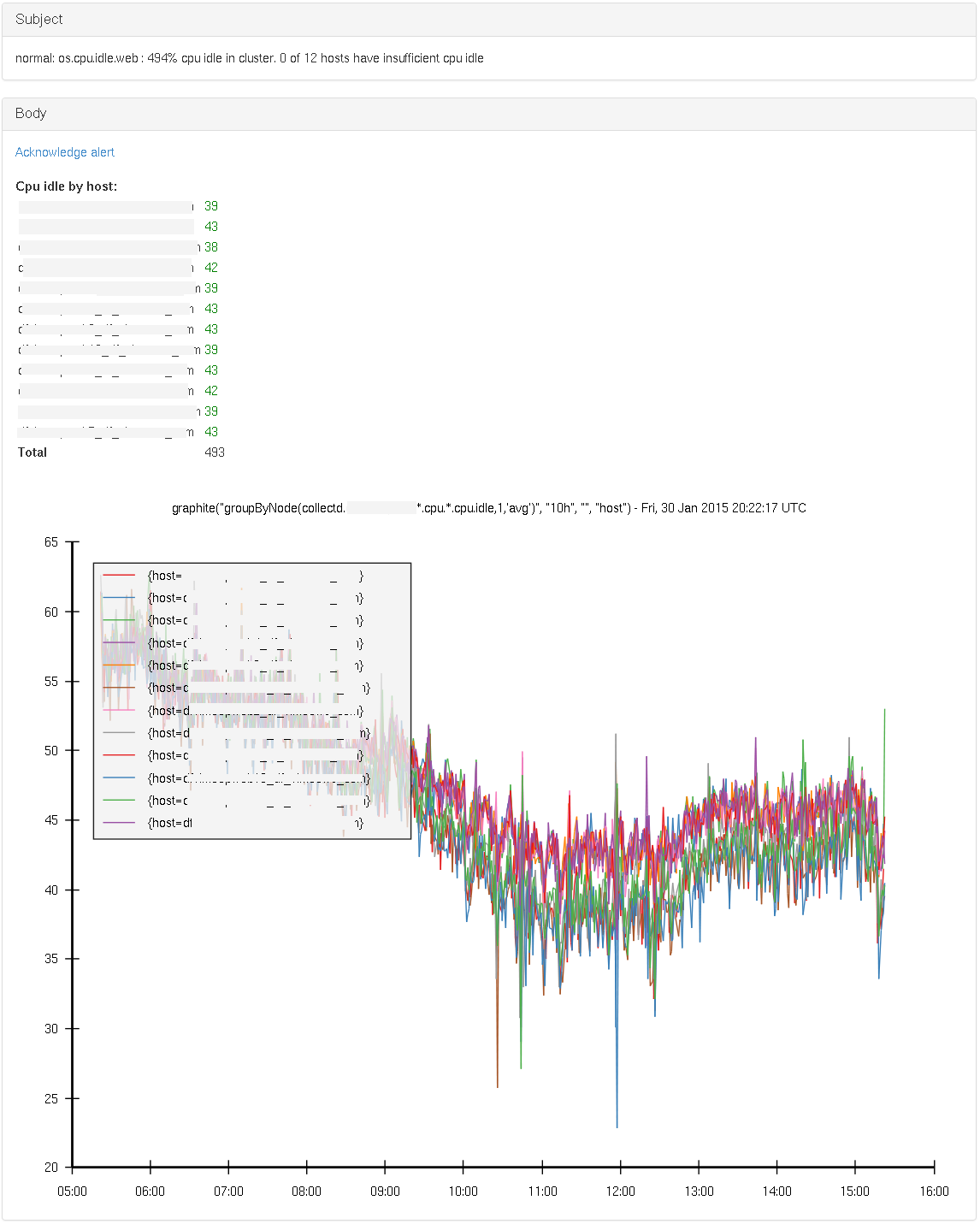 172 173 <p class="h4">Rule</p> 174 175 ~~~ 176 alert os.cpu.idle.web { 177 template = os_cpu_idle_web 178 $expr = "groupByNode(collectd.dc1-web*.cpu.*.cpu.idle,1,'avg')" 179 $idle_series_by_host = graphite($expr, "5m", "", "host") 180 $idle_series_by_host_historical = graphite($expr, "10h", "", "host") 181 $idle_by_host = avg($idle_series_by_host) 182 $num_hosts = len(t($idle_by_host, "")) 183 $idle_total= sum(t($idle_by_host, "")) 184 185 $hosts_low = t($idle_by_host < 20, "") 186 $num_hosts_low = sum($hosts_low) 187 $ratio_hosts_low = ($num_hosts_low / $num_hosts) 188 189 warn = ($ratio_hosts_low > 0.8) || ($idle_total < 200) 190 crit = ($ratio_hosts_low > 0.9) || ($idle_total < 50) 191 } 192 ~~~ 193 194 <p class="h4">Template</p> 195 196 ~~~ 197 template os_cpu_idle_web { 198 body = `<a href="{{.Ack}}">Acknowledge alert</a> 199 <br> 200 <br> 201 <b>Cpu idle by host:</b> 202 <table> 203 {{range $f := .EvalAll .Alert.Vars.idle_by_host}} 204 <tr><td>{{ $f.Group.host}}</td> 205 {{if lt $f.Value 20.0}} 206 <td style="color: red;"> 207 {{else}} 208 <td style="color: green;"> 209 {{end}} 210 {{ $f.Value | printf "%.0f" }}</td></tr> 211 {{end}} 212 <tr><td><b>Total</b></td><td>{{.Eval .Alert.Vars.idle_total | printf "%.0f" }}</td></tr> 213 </table> 214 <br> 215 {{.Graph .Alert.Vars.idle_series_by_host_historical}} 216 ` 217 subject = {{.Last.Status}}: {{.Alert.Name}} : {{.Eval .Alert.Vars.idle_total | printf "%.0f"}}% cpu idle in cluster. {{.Eval .Alert.Vars.num_hosts_low}} of {{.Eval .Alert.Vars.num_hosts}} hosts have insufficient cpu idle 218 } 219 ~~~ 220 221 ## Forecasting Alerts 222 223 ### Forecast Disk space 224 This alert mixes thresholds and forecasting to trigger alerts based on disk space. This can be very useful because it can warn about a situation that will result in the loss of diskspace before it is too late to go and fix the issue. This is combined with a threshold based alert because a good general rule is to try to eliminate duplicate notifications / alerts on the same object. So these are applied and tuned by the operator and are not auto-magic. 225 226 Once we have string support for lookup tables, the duration that the forecast acts on can be tuned per host when relevant (some disks will have longer or shorter periodicity). 227 228 The forecastlr function returns the number of seconds until the specified value will be reached according to a linear regression. It is a pretty naive way of forecasting, but has been effective. Also, there is no reason we can't extend bosun to include more advanced forecasting functions. 229 230 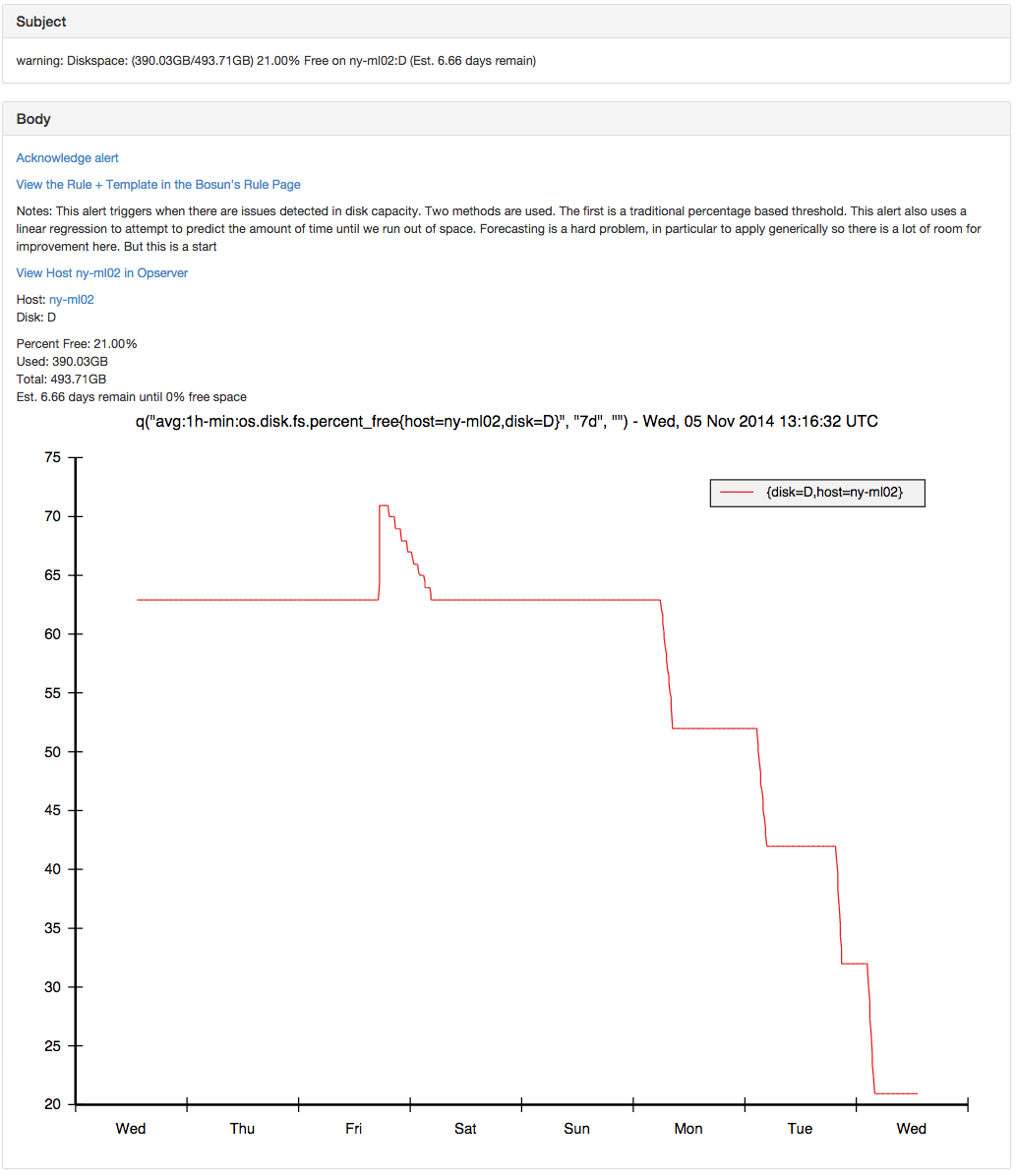 231 232 <p class="h4">Rule</p> 233 234 ~~~ 235 lookup disk_space { 236 entry host=ny-omni01,disk=E { 237 warn_percent_free = 2 238 crit_percent_free = 0 239 } 240 entry host=*,disk=* { 241 warn_percent_free = 10 242 crit_percent_free = 0 243 } 244 } 245 246 alert os.diskspace { 247 macro = host_based 248 $notes = This alert triggers when there are issues detected in disk capacity. Two methods are used. The first is a traditional percentage based threshold. This alert also uses a linear regression to attempt to predict the amount of time until we run out of space. Forecasting is a hard problem, in particular to apply generically so there is a lot of room for improvement here. But this is a start 249 template = diskspace 250 $filter = host=*,disk=* 251 252 ##Forecast Section 253 #Downsampling avg on opentsdb side will save the linear regression a lot of work 254 $days_to_zero = (forecastlr(q("avg:6h-avg:os.disk.fs.percent_free{$filter}", "7d", ""), 0) / 60 / 60 / 24) 255 #Threshold can be higher here once we support string lookups in lookup tables https://github.com/bosun-monitor/bosun/issues/268 256 $warn_days = $days_to_zero > 0 && $days_to_zero < 7 257 $crit_days = $days_to_zero > 0 && $days_to_zero < 1 258 259 ##Percent Free Section 260 $pf_time = "5m" 261 $percent_free = avg(q("avg:os.disk.fs.percent_free{host=*,disk=*}", $pf_time, "")) 262 $used = avg(q("avg:os.disk.fs.space_used{host=*,disk=*}", $pf_time, "")) 263 $total = avg(q("avg:os.disk.fs.space_total{host=*,disk=*}", $pf_time, "")) 264 $warn_percent = $percent_free < lookup("disk_space", "warn_percent_free") 265 #Linux stops root from writing at less than 5% 266 $crit_percent = $percent_free < lookup("disk_space", "crit_percent_free") 267 #For graph (long time) 268 $percent_free_graph = q("avg:1h-min:os.disk.fs.percent_free{host=*,disk=*}", "4d", "") 269 270 ##Main Logic 271 warn = $warn_percent || $warn_days 272 crit = $crit_percent || $crit_days 273 274 ##Options 275 squelch = $disk_squelch 276 ignoreUnknown = true 277 #This is needed because disks go away when the forecast doesn't 278 unjoinedOk = true 279 280 } 281 ~~~ 282 283 <p class="h4">Template</p> 284 285 ~~~ 286 template diskspace { 287 body = `{{template "header" .}} 288 <p>Host: <a href="{{.HostView .Group.host | short }}">{{.Group.host}}</a> 289 <br>Disk: {{.Group.disk}} 290 291 <p>Percent Free: {{.Eval .Alert.Vars.percent_free | printf "%.2f"}}% 292 <br>Used: {{.Eval .Alert.Vars.used | bytes}} 293 <br>Total: {{.Eval .Alert.Vars.total | bytes}} 294 <br>Est. {{.Eval .Alert.Vars.days_to_zero | printf "%.2f"}} days remain until 0% free space 295 {{/* .Graph .Alert.Vars.percent_free_graph */}} 296 {{printf "q(\"avg:1h-min:os.disk.fs.percent_free{host=%s,disk=%s}\", \"7d\", \"\")" .Group.host .Group.disk | .Graph}} 297 ` 298 subject = {{.Last.Status}}: Diskspace: ({{.Alert.Vars.used | .Eval | bytes}}/{{.Alert.Vars.total | .Eval | bytes}}) {{.Alert.Vars.percent_free | .Eval | printf "%.2f"}}% Free on {{.Group.host}}:{{.Group.disk}} (Est. {{.Eval .Alert.Vars.days_to_zero | printf "%.2f"}} days remain) 299 } 300 ~~~ 301 302 ## Anomalous Alerts 303 The idea of an anomalous alert it in Bosun is that a deviation from the norm can be detected without having to set static thresholds for everything. These can be very useful when the amount of data makes it unfeasible to manually set thresholds for these. Attempts to fully automate this from what I have seen and been told are noisy. So Bosun doesn't just have an "anomalous" function, but rather you can query history and do various comparisons with that data. 304 305 ### Anomalous response per route 306 At Stack Exchange we send which web route was hit to haproxy so that gets logged (It is removed before sent to the client). With over a thousand routes, static thresholds are not feasible. So this looks at history using the band function, and compares it to current performance. An alert is then triggered if the route makes up more than 1% of our total hits, and has gotten slower or faster by more than 10 milliseconds. 307 308 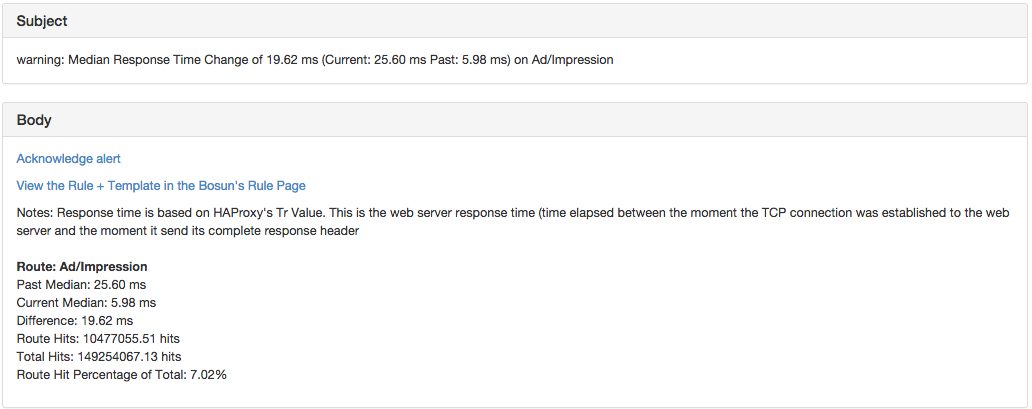 309 310 <p class="h4">Rule</p> 311 312 ~~~ 313 alert slower.route.performance { 314 template = route.performance 315 $notes = Response time is based on HAProxy's Tr Value. This is the web server response time (time elapsed between the moment the TCP connection was established to the web server and the moment it send its complete response header 316 $duration = "1d" 317 $route=* 318 $metric = "sum:10m-avg:haproxy.logs.route_tr_median{route=$route}" 319 $route_hit_metric = "sum:10m-avg:rate{counter,,1}:haproxy.logs.hits_by_route{route=$route}" 320 $total_hit_metric = "sum:10m-avg:rate{counter,,1}:haproxy.logs.hits_by_route" 321 $route_hits = change($route_hit_metric, $duration, "") 322 $total_hits = change($total_hit_metric, $duration, "") 323 $hit_percent = $route_hits / $total_hits * 100 324 $current_hitcount = len(q($metric, $duration, "")) 325 $period = "7d" 326 $lookback = 4 327 $history = band($metric, $duration, $period, $lookback) 328 $past_dev = dev($history) 329 $past_median = percentile($history, .5) 330 $current_median = percentile(q($metric, $duration, ""), .5) 331 $diff = $current_median - $past_median 332 warn = $current_median > ($past_median + $past_dev*2) && abs($diff) > 10 && $hit_percent > 1 333 warnNotification = default 334 ignoreUnknown = true 335 } 336 ~~~ 337 338 <p class="h4">Template</p> 339 ~~~ 340 template route.performance { 341 body = `{{template "header" .}} 342 <br> 343 <br><span style="font-weight: bold;">Route: {{.Group.route}}</span> 344 <br>Past Median: {{.Eval .Alert.Vars.current_median | printf "%.2f ms"}} 345 <br>Current Median: {{.Eval .Alert.Vars.past_median | printf "%.2f ms"}} 346 <br>Difference: {{.Eval .Alert.Vars.diff | printf "%.2f ms"}} 347 <br>Route Hits: {{.Eval .Alert.Vars.route_hits | printf "%.2f hits"}} 348 <br>Total Hits: {{.Eval .Alert.Vars.total_hits | printf "%.2f hits "}} 349 <br>Route Hit Percentage of Total: {{.Eval .Alert.Vars.hit_percent | printf "%.2f"}}% 350 ` 351 subject = {{.Last.Status}}: Median Response Time Change of {{.Eval .Alert.Vars.diff | printf "%.2f ms"}} (Current: {{.Eval .Alert.Vars.current_median | printf "%.2f ms"}} Past: {{.Eval .Alert.Vars.past_median | printf "%.2f ms"}}) on {{.Group.route}} 352 } 353 ~~~ 354 355 ### Graphite: Anomalous traffic volume per country 356 At Vimeo, we use statsdaemon to track web requests/s. Here we'll use metrics which describe the web traffic on a per server basis (we get them summed together into one series from Graphite via the sum function), and we also use a set of metrics that are already aggregated across all servers, but broken down per country. 357 In the alert we leverage the banding functionality to get a similar timeframe of past weeks. We then verify that the median of the total web traffic for this period is not significantly (20% or more) less than the median of past periods. And on the per-country basis, we verify that the current median is not 3 or more standard deviations below the past median. Note also that we count how many countries have issues and use that to decide wether the alert is critical or warning. 358 Note that the screenshot below has been modified. The countries and values are not accurate. 359 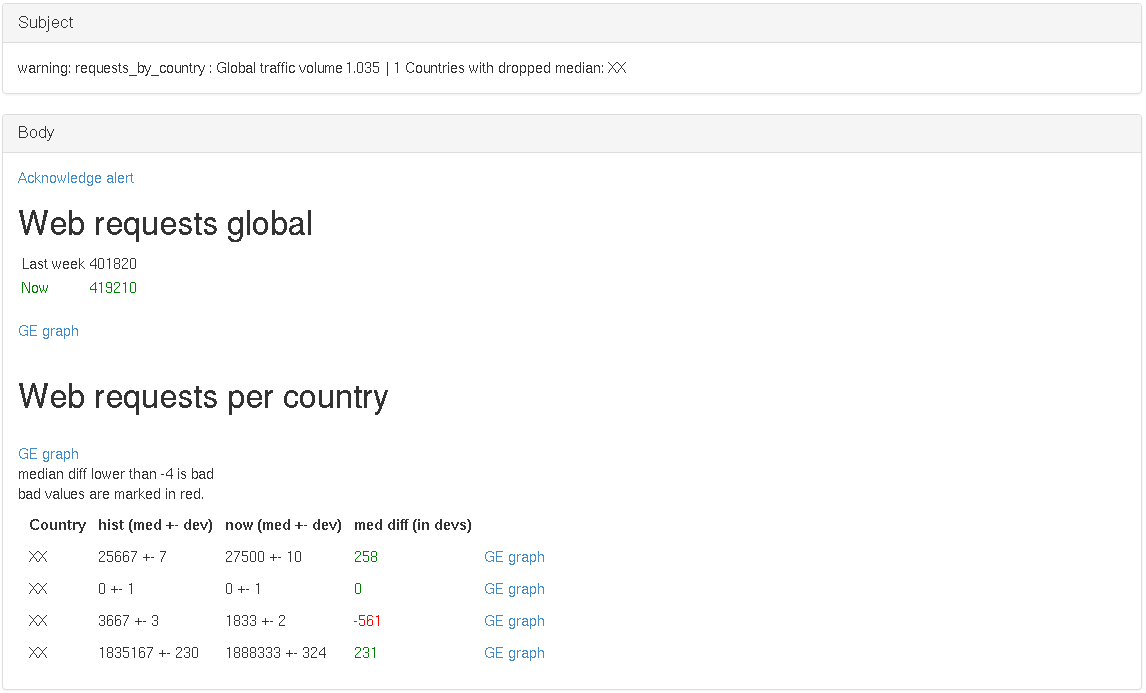 360 361 <p class="h4">Rule</p> 362 ~~~ 363 alert requests_by_country { 364 template = requests_by_country 365 $r = "transformNull(sum(stats.dc1*.request.web),0)" 366 $r_hist = graphiteBand($r, "60m","7d", "",1) 367 $r_now = graphite($r, "60m", "", "") 368 $r_hist_med = median($r_hist) 369 $r_now_med = median($r_now) 370 371 $rbc = "aliasByNode(transformNull(stats._sum_dc1.request_by_country.*,0),3)" 372 $rbc_hist = graphiteBand($rbc, "60m","7d", "country",1) 373 $rbc_now = graphite($rbc, "60m", "", "country") 374 $rbc_hist_med = median($rbc_hist) 375 $rbc_hist_dev= dev($rbc_hist) 376 $rbc_now_med = median($rbc_now) 377 $rbc_now_dev = dev($rbc_now) 378 379 $rbc_med_diff = ($rbc_now_med - $rbc_hist_med)/$rbc_hist_dev 380 $rbc_med_bad = $rbc_med_diff < -3 381 382 $r_strength = $r_now_med/$r_hist_med 383 $rbc_med_issues = sum(t($rbc_med_bad,"")) 384 warn = $rbc_med_issues > 0 385 crit = $rbc_med_issues > 10 || $r_strength < 0.8 386 warnNotification = web 387 critNotification = web 388 } 389 ~~~ 390 391 #### Template 392 ~~~ 393 template requests_by_country { 394 body = ` 395 <a href="{{.Ack}}">Acknowledge alert</a> 396 <br/> 397 <h2>Web requests global</h2> 398 <table> 399 <tr><td>Last week</td><td>{{.Eval .Alert.Vars.r_hist_med | printf "%.0f"}}</td></tr> 400 {{if lt (.Eval .Alert.Vars.r_strength) 0.7}} 401 <tr style="color:red;"> 402 {{else}} 403 {{if lt (.Eval .Alert.Vars.r_strength) 1.0}} 404 <tr> 405 {{else}} 406 <tr style="color:green;"> 407 {{end}} 408 {{end}} 409 <td> Now</td><td>{{.Eval .Alert.Vars.r_now_med | printf "%.0f"}}</td></tr> 410 </table> 411 <br><a href="http://graphexplorer/index/statsd request.web sum by n1 from -1week||">GE graph</a> 412 <br> 413 <br> 414 <h2>Web requests per country</h2> 415 <br><a href="http://graphexplorer/index/request by country _sum_dc1">GE graph</a> 416 <br>median diff lower than -3 is bad 417 <br>bad values are marked in red. 418 <table style="border-spacing: 10px;"> 419 <tr> 420 <th>Country</th> 421 <th>hist (med +- dev)</th> 422 <th>now (med +- dev)</th> 423 <th>med diff (in devs)</th> 424 </tr> 425 {{range $r := .LeftJoin .Alert.Vars.rbc_hist_med .Alert.Vars.rbc_hist_dev .Alert.Vars.rbc_now_med .Alert.Vars.rbc_now_dev .Alert.Vars.rbc_med_diff .Alert.Vars.rbc_med_bad}} 426 <tr> 427 <td>{{(index $r 0).Group.country}}</td> 428 <td> {{ (index $r 0).Value | printf "%.0f"}} +- {{ (index $r 1).Value | printf "%.0f"}}</td> 429 <td> {{ (index $r 2).Value | printf "%.0f"}} +- {{ (index $r 3).Value | printf "%.0f"}}</td> 430 {{ if gt (index $r 5).Value 0.0}} 431 <td style="color:red;" >{{ (index $r 4).Value | printf "%.0f"}}</td> 432 {{else}} 433 <td style="color:green;"> {{ (index $r 4).Value | printf "%.0f"}}</td> 434 {{end}} 435 <td><a href="http://graphexplorer/index/request by country _sum_dc1 n3={{(index $r 0).Group.country}}||">GE graph</a></td> 436 </tr> 437 {{end}} 438 </table> 439 ` 440 subject =` 441 {{.Last.Status}}: {{.Alert.Name}} : 442 Global traffic volume {{.Eval .Alert.Vars.r_strength | printf "%.3f"}} 443 | {{.Eval .Alert.Vars.rbc_med_issues | printf "%.0f"}} Countries with dropped median: 444 {{range $r :=.EvalAll .Alert.Vars.rbc_med_bad}} 445 {{ if gt $r.Value 0.0}} 446 {{$r.Group.country}} 447 {{end}} 448 {{end}}` 449 } 450 ~~~ 451 452 453 ## Alerts with Notification Breakdowns 454 A common pattern is to trigger an alert on a scope that covers multiple metrics 455 (or hosts, services, etc.), but then to send more detailed information in 456 notification. This is useful when you notice that certain failures tend to go 457 together. 458 459 ### Linux TCP Stack Alert 460 When alerting on issues with the Linux TCP stack on a host, you probably don't 461 want N alerts about all TCP stats, but just one alert that shows breakdowns: 462 463  464 465 <p class="h4">Rule</p> 466 467 ~~~ 468 # This macro isn't Show, but makes it so IT and SRE are notified for their 469 respective systems, when an alert is host based. 470 471 lookup linux_tcp { 472 entry host=ny-tsdb03 { 473 backlog_drop_threshold = 500 474 } 475 entry host=* { 476 backlog_drop_threshold = 100 477 } 478 } 479 480 alert linux.tcp { 481 macro = host_based 482 $notes = ` 483 This alert checks for various errors or possible issues in the 484 TCP stack of a Linux host. Since these tend to happen at the 485 same time, combining them into a single alert reduces 486 notification noise.` 487 template = linux.tcp 488 $time = 10m 489 $abort_failed = change("sum:rate{counter,,1}:linux.net.stat.tcp.abortfailed{host=*}", "$time", "") 490 $abort_mem = change("sum:rate{counter,,1}:linux.net.stat.tcp.abortonmemory{host=*}", "$time", "") 491 $ofo_pruned = change("sum:rate{counter,,1}:linux.net.stat.tcp.ofopruned{host=*}", "$time", "") 492 $rcv_pruned = change("sum:rate{counter,,1}:linux.net.stat.tcp.rcvpruned{host=*}", "$time", "") 493 $backlog_drop = change("sum:rate{counter,,1}:linux.net.stat.tcp.backlogdrop{host=*}", "$time", "") 494 $syncookies_sent = change("sum:rate{counter,,1}:linux.net.stat.tcp.syncookiessent{host=*}", "$time", "") 495 $total_err = $abort_failed + $ofo_pruned + $rcv_pruned + $backlog_drop + $syncookies_sent 496 warn = $abort_failed || $ofo_pruned > 100 || $rcv_pruned > 100 || $backlog_drop > lookup("linux_tcp", "backlog_drop_threshold") || $syncookies_sent 497 } 498 ~~~ 499 500 <p class="h4">Template Def</p> 501 502 ~~~ 503 template linux.tcp { 504 body = ` 505 {{template "header" .}} 506 <table> 507 {{/* TODO: Reference what each stat means */}} 508 <tr><th>Stat</th><th>Count in the last {{.Alert.Vars.time}}</th></tr> 509 <tr><td>TCP Abort Failed</td><td>{{.Eval .Alert.Vars.abort_failed | printf "%.2f"}}<td></tr> 510 <tr><td>Out Of Order Pruned</td><td>{{.Eval .Alert.Vars.ofo_pruned | printf "%.2f"}}<td></tr> 511 <tr><td>Receive Pruned</td><td>{{.Eval .Alert.Vars.rcv_pruned | printf "%.2f"}}<td></tr> 512 <tr><td>Backlog Dropped</td><td>{{.Eval .Alert.Vars.backlog_drop | printf "%.2f"}}<td></tr> 513 <tr><td>Syn Cookies Sent</td><td>{{.Eval .Alert.Vars.syncookies_sent | printf "%.2f"}}<td></tr> 514 <tr><td>TOTAL Of Above</td><td>{{.Eval .Alert.Vars.total_err | printf "%.2f"}}<td></tr> 515 </table>` 516 subject = {{.Last.Status}}: {{.Eval .Alert.Vars.total_err | printf "%.2f"}} tcp errors on {{.Group.host}} 517 } 518 ~~~ 519 520 ### Dell Hardware Alert 521 No need for N Hardware alerts when hardware is bad, just send one notification with the information needed. Metadata (generally string information) can be reported to bosun, and is reported by scollector. Therefore in the notification we can include things like the model and the service tag. 522 523 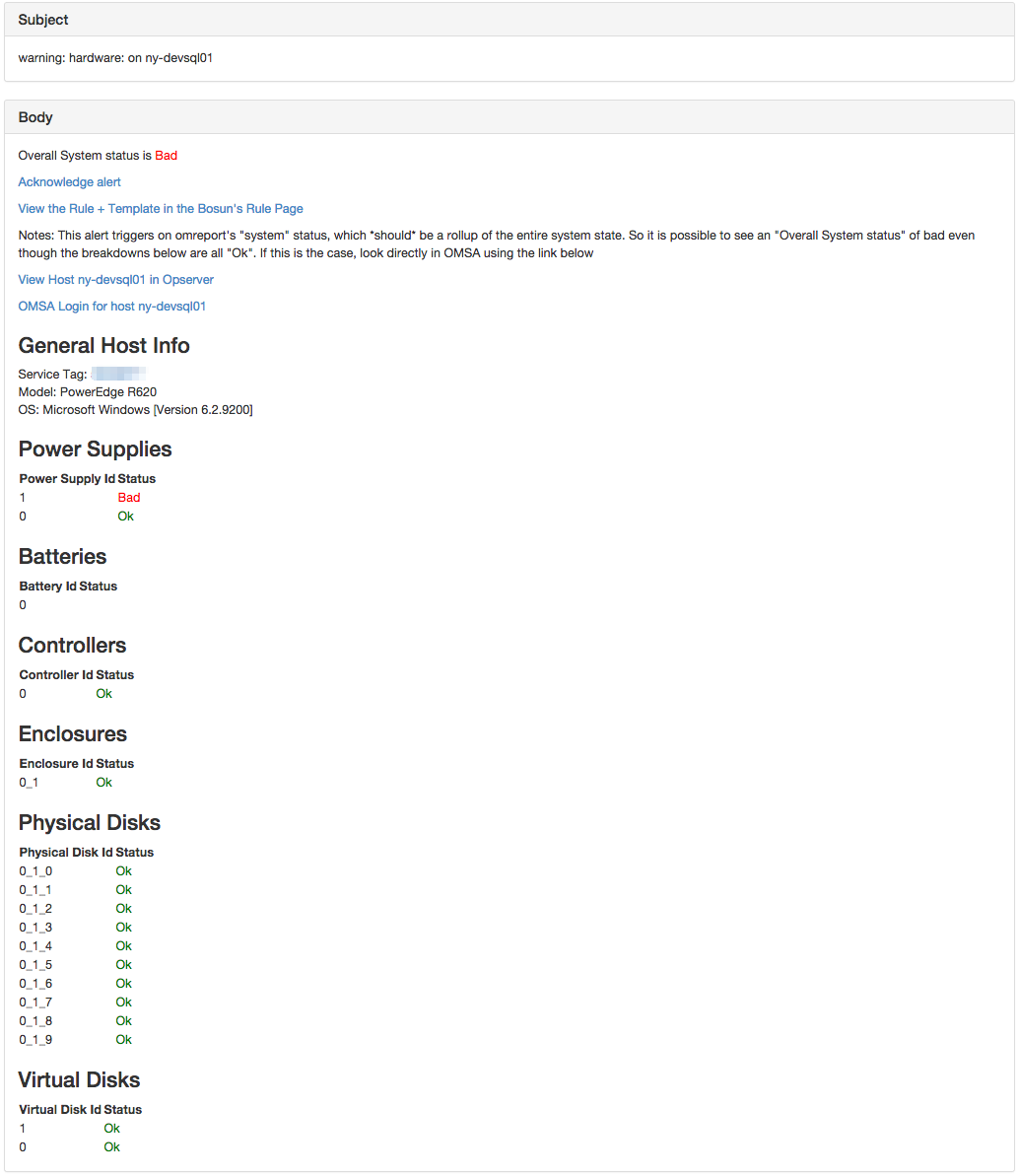 524 525 <p class="h4">Rule</p> 526 ~~~ 527 alert hardware { 528 macro = host_based 529 template = hardware 530 $time = "30m" 531 $notes = This alert triggers on omreport's "system" status, which *should* be a rollup of the entire system state. So it is possible to see an "Overall System status" of bad even though the breakdowns below are all "Ok". If this is the case, look directly in OMSA using the link below 532 533 #By Component 534 $power = max(q("sum:hw.ps{host=*,id=*}", $time, "")) 535 $battery = max(q("sum:hw.storage.battery{host=*,id=*}", $time, "")) 536 $controller = max(q("sum:hw.storage.controller{host=*,id=*}", $time, "")) 537 $enclosure = max(q("sum:hw.storage.enclosure{host=*,id=*}", $time, "")) 538 $physical_disk = max(q("sum:hw.storage.pdisk{host=*,id=*}", $time, "")) 539 $virtual_disk = max(q("sum:hw.storage.vdisk{host=*,id=*}", $time, "")) 540 #I believe the system should report the status of non-zero if the anything is bad 541 #(omreport system), so everything else is for notification purposes. This works out 542 #because not everything has all these components 543 $system = max(q("sum:hw.system{host=*,component=*}", $time, "")) 544 545 #Component Summary Per Host 546 $s_power= sum(t($power, "host")) 547 $s_battery = sum(t($battery, "host")) 548 549 warn = $system 550 } 551 ~~~ 552 553 <p class="h4">Template</p> 554 ~~~ 555 template hardware { 556 body = ` 557 <p>Overall System status is {{if gt .Value 0.0}} <span style="color: red;">Bad</span> 558 {{else}} <span style="color: green;">Ok</span> 559 {{end}}</p> 560 {{template "header" .}} 561 <p><a href="https://{{.Group.host}}:1311/OMSALogin?msgStatus=null">OMSA Login for host {{.Group.host}}</a> 562 <h3>General Host Info</h3> 563 {{ with .GetMeta "" "svctag" (printf "host=%s" .Group.host) }} 564 Service Tag: <a href="http://www.dell.com/support/home/us/en/04/product-support/servicetag/{{.}}">{{.}}</a> 565 {{ end }} 566 567 {{ with .GetMeta "" "model" (printf "host=%s" .Group.host) }} 568 <br>Model: {{.}} 569 {{ end }} 570 571 {{ with .GetMeta "" "version" (printf "host=%s" .Group.host) }} 572 <br>OS: {{.}} 573 {{ end }} 574 575 <h3>Power Supplies</h3> 576 <table> 577 <tr><th>Power Supply Id</th><th>Status</th></tr> 578 {{range $r := .EvalAll .Alert.Vars.power}} 579 {{if eq $r.Group.host $.Group.host}} 580 <tr> 581 <td>{{$r.Group.id}}</td> 582 {{if gt $r.Value 0.0}} <td style="color: red;">Bad</td> 583 {{else}} <td style="color: green;">Ok</td> 584 {{end}} 585 </tr> 586 {{end}} 587 {{end}} 588 </table> 589 590 <h3>Batteries</h3> 591 <table> 592 <tr><th>Battery Id</th><th>Status</th></tr> 593 {{range $r := .EvalAll .Alert.Vars.battery}} 594 {{if eq $r.Group.host $.Group.host}} 595 <tr> 596 <td>{{$r.Group.id}}</td> 597 </tr> 598 {{end}} 599 {{end}} 600 </table> 601 602 <h3>Controllers</h3> 603 <table> 604 <tr><th>Controller Id</th><th>Status</th></tr> 605 {{range $r := .EvalAll .Alert.Vars.controller}} 606 {{if eq $r.Group.host $.Group.host}} 607 <tr> 608 <td>{{$r.Group.id}}</td> 609 {{if gt $r.Value 0.0}} <td style="color: red;">Bad</td> 610 {{else}} <td style="color: green;">Ok</td> 611 {{end}} 612 </tr> 613 {{end}} 614 {{end}} 615 </table> 616 617 <h3>Enclosures</h3> 618 <table> 619 <tr><th>Enclosure Id</th><th>Status</th></tr> 620 {{range $r := .EvalAll .Alert.Vars.enclosure}} 621 {{if eq $r.Group.host $.Group.host}} 622 <tr> 623 <td>{{$r.Group.id}}</td> 624 {{if gt $r.Value 0.0}} <td style="color: red;">Bad</td> 625 {{else}} <td style="color: green;">Ok</td> 626 {{end}} 627 </tr> 628 {{end}} 629 {{end}} 630 </table> 631 632 <h3>Physical Disks</h3> 633 <table> 634 <tr><th>Physical Disk Id</th><th>Status</th></tr> 635 {{range $r := .EvalAll .Alert.Vars.physical_disk}} 636 {{if eq $r.Group.host $.Group.host}} 637 <tr> 638 <td>{{$r.Group.id}}</td> 639 {{if gt $r.Value 0.0}} <td style="color: red;">Bad</td> 640 {{else}} <td style="color: green;">Ok</td> 641 {{end}} 642 </tr> 643 {{end}} 644 {{end}} 645 </table> 646 647 <h3>Virtual Disks</h3> 648 <table> 649 <tr><th>Virtual Disk Id</th><th>Status</th></tr> 650 {{range $r := .EvalAll .Alert.Vars.virtual_disk}} 651 {{if eq $r.Group.host $.Group.host}} 652 <tr> 653 <td>{{$r.Group.id}}</td> 654 {{if gt $r.Value 0.0}} <td style="color: red;">Bad</td> 655 {{else}} <td style="color: green;">Ok</td> 656 {{end}} 657 </tr> 658 {{end}} 659 {{end}} 660 </table> 661 ` 662 subject = {{.Last.Status}}: {{replace .Alert.Name "." " " -1}}: on {{.Group.host}} 663 } 664 ~~~ 665 666 ### Backup -- Advanced Grouping 667 668 This shows the state of backups based on multiple conditions and multiple metrics. It also simulates a Left Join operation by substituting NaN Values with numbers and the nv functions in the rule, and using the LeftJoin template function. This stretches Bosun when it comes to grouping. Generally you might want to capture this sort of logic in your collector when going to these extremes, but this displays that you don't have to be limited to that: 669 670 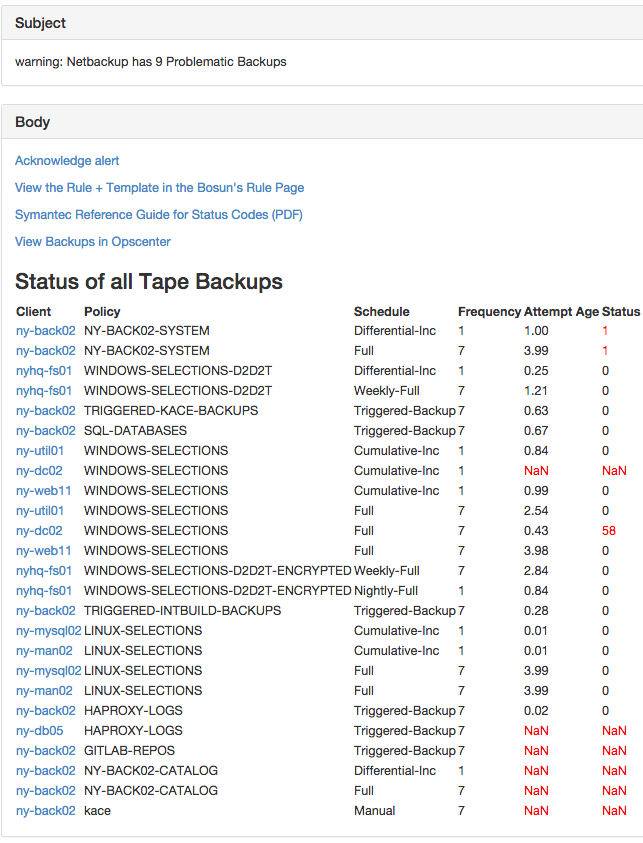 671 672 <p class="h4">Rule</p> 673 674 ~~~ 675 alert netbackup { 676 template = netbackup 677 $tagset = {class=*,client=*,schedule=*} 678 #Turn seconds into days 679 $attempt_age = max(q("sum:netbackup.backup.attempt_age$tagset", "10m", "")) / 60 / 60 / 24 680 $job_frequency = max(q("sum:netbackup.backup.frequency$tagset", "10m", "")) / 60 / 60 / 24 681 $job_status = max(q("sum:netbackup.backup.status$tagset", "10m", "")) 682 #Add 1/4 a day to the frequency as some buffer 683 $not_run_in_time = nv($attempt_age, 1e9) > nv($job_frequency+.25, 1) 684 $problems = $not_run_in_time || nv($job_status, 1) 685 $summary = sum(t($problems, "")) 686 warn = $summary 687 } 688 ~~~ 689 690 <p class="h4">Temp</p>late Def 691 692 ~~~ 693 template netbackup { 694 subject = `{{.Last.Status}}: Netbackup has {{.Eval .Alert.Vars.summary}} Problematic Backups` 695 body = ` 696 {{template "header" .}} 697 <p><a href="http://www.symantec.com/business/support/index?page=content&id=DOC5181">Symantec Reference Guide for Status Codes (PDF)</a> 698 <p><a href="https://ny-back02.ds.stackexchange.com/opscenter/">View Backups in Opscenter</a> 699 <h3>Status of all Tape Backups</h3> 700 <table> 701 <tr><th>Client</th><th>Policy</th><th>Schedule</th><th>Frequency</th><th>Attempt Age</th><th>Status</th></tr> 702 {{ range $v := .LeftJoin .Alert.Vars.job_frequency .Alert.Vars.attempt_age .Alert.Vars.job_status}} 703 {{ $freq := index $v 0 }} 704 {{ $age := index $v 1 }} 705 {{ $status := index $v 2 }} 706 <tr> 707 <td><a href="https://status.stackexchange.com/dashboard/node?node={{$freq.Group.client| short}}">{{$freq.Group.client| short}}</td> 708 <td>{{$freq.Group.class}}</td> 709 <td>{{$freq.Group.schedule}}</td> 710 <td>{{$freq.Value}}</td> 711 <td {{if gt $age.Value $freq.Value }} style="color: red;" {{end}}>{{$age.Value | printf "%.2f"}}</td> 712 <td{{if gt $status.Value 0.0}} style="color: red;" {{end}}>{{$status.Value}}</td> 713 <tr> 714 {{end}} 715 </table>` 716 } 717 718 ~~~ 719 720 ## Conditional Alerts 721 722 ### Swapping notification unless there is a high exim mail queue 723 This alert makes it so that swapping won't trigger if there is a high exim mail queue on the host that is swapping. All operators (such as &&) perform a join, so this alert makes it so if there is no exim mailq for that host, then it is as if the mail queue were high. 724 725 <p class="h4">Rule</p> 726 727 ~~~ 728 alert linux.swapping { 729 macro = host_based 730 template = generic 731 $notes = This alert does not trigger for our mail servers with the mail queue is high 732 #NV makes it so that if mailq doesn't exist for the Host, the NaN that gets returned gets replaced with a 1 (True) 733 $mail_q = nv(max(q("sum:exim.mailq_count{host=*}", "2h", "") > 5000), 1) 734 $metric = "sum:rate{counter,,1}:linux.mem.pswp{host=*,direction=in}" 735 $q = (median(q($metric, "2h", "")) > 1) && ! $mail_q 736 warn = $q 737 squelch = host=ny-devsearch*|ny-git01 738 } 739 ~~~ 740 741 {% endraw %} 742 </div> 743 </div>